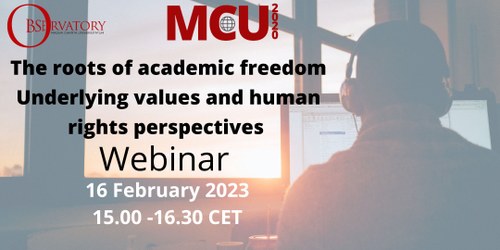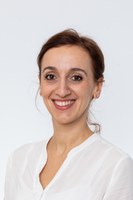What would be the content of academic freedom as a human right, and what the benefits of recognising it as an enforceable human right?
Date: 16 FEBRUARY 2023 from 15:00 to 16:30
Event location: Online event
Type: Special Events

The roots of academic freedom – Underlying values and human rights perspectives
In the United Kingdom, academic freedom has always been a matter of convention rather than the law, let alone human rights law. In the United States, academic freedom is recognised as a fundamental right under the Constitution, signifying university autonomy, however, rather than individual rights. On the European continent, the reference in constitutions is usually to freedom of science. Especially newer constitutions, such as those of South Africa or the European Union, however, often expressly recognise a human right to academic freedom. While international human rights law does not explicitly recognise academic freedom in any treaty, it might nevertheless potentially be subsumed under provisions on the right to science, freedom of expression, and/or the right to education.
On 16 February 2023, the Magna Charta Observatory held a webinar exploring the nature of academic freedom as a human right. Whether academic freedom is a human right and, if so, what exactly it could be said to protect, are questions requiring further examination. The answers to these questions have relevance to choosing strategies in achieving enhanced protection for academic freedom, also for the Observatory. Three speakers had been invited to deliberate on these questions, and answer related questions from an interested audience.
Helle Porsdam, Professor of History and Cultural Rights and holder of a UNESCO Chair of Cultural Rights at the University of Copenhagen, Denmark, in a presentation, entitled Academic freedom, scientific freedom, and the human right to science, sought to justify academic freedom as a component of the wider scientific freedom, which, in itself, was an express component of the right to science, itself expressly protected by international human rights treaty law. As such, academic/scientific freedom was crucial to achieving citizens’ access to the benefits of science, this being the central claim under the right to science. The right to science calls on states to take active steps towards the dissemination of science. This, according to Porsdam, implied that academic/scientific freedom was not a mere freedom, but also a duty of academics to disseminate their research among the wider public, moreover in a language also understood by non-experts.
Vasiliki Kosta, Associate Professor of European Law at Leiden University, the Netherlands, spoke on the topic of Academic freedom in the EU Charter of Fundamental Rights. She explained that the European Charter of Fundamental Rights contained an Article 13 expressly protecting scientific and academic freedom. While this provision had so far been neglected, this changed with the European Court of Justice in 2020, in the case of Commission v. Hungary, relying inter alia on that provision to find that Hungary, by adopting a law that effectively deprived the Central European University of its organisational structure, had violated Article 13. This constitutes express recognition in E.U. law that academic freedom is a fundamental right that also protects university autonomy. This, according to Kosta, could lead to other aspects of academic freedom, such as academic self-governance, also being subsumed under Article 13. From the ECJ, protection might spill over to the European Court of Human Rights, which might provide more comprehensive protection of academic freedom than so far under the right to freedom of expression in Europe.
Klaus D. Beiter, Professor of Law at North-West University in Potchefstroom, South Africa, who also moderated the webinar, presented a talk, entitled “Yearning to belong”: Finding a home for the right to academic freedom in the International Bill of Human Rights. The core value of human rights law is human dignity. In justifying academic freedom as a human right, one needed to answer the question whether academic freedom served the fulfilment of human dignity. This Beiter found it did, by creating an enabling environment conducive to higher learning and scientific progress, these ultimately benefiting human dignity. The speaker analysed the various components of academic freedom as expressly protected by UNESCO’s 1997 Recommendation concerning the Status of Higher Education Teaching Personnel. These include – apart from the academic’s freedom of teaching and research – institutional autonomy, academic self-governance and collegiality, and employment security and tenure. Beiter ascertained the rationale of each of these components by specifically relating them to the core right of individual academic freedom, which, as explained, is directed at the protection of human dignity.
The presentations were followed by a Q&A session during which a number of important questions on scientific/academic freedom were addressed. Prof. Porsdam further elaborated on the concept of ‘science diplomacy’ as the duty of academics. Questions concerning the scope of academics’ speech rights intra and extramurally, and how this compared to the scope of ordinary speech rights, were answered by Prof. Beiter. He also commented on the concept of student academic freedom. Prof. Kosta’s response to questions concerning the commercialisation of teaching and research underlined the importance of the webinar’s discussion. Insofar as commercialisation in, for example, the European Commission’s policies in the context of the Bologna process, or in the design of European research funding schemes that promote essentially ‘useful’ science, undermines academic freedom, it becomes an issue that may be legally opposed by relying on the fundamental right to academic freedom.
Klaus Beiter
* Helle Porsdam, Professor of History and Cultural Rights, University of Copenhagen, SAXO-Institute & Faculty of Law, Centre for Interdisciplinary Studies of Law
Academic freedom, scientific freedom, and the human right to science
* Vasiliki Kosta, Associate Professor, Leiden University, Leiden Law School, Europe Institute
Academic freedom in the EU Charter of Fundamental Rights
* Klaus D. Beiter, Professor of Law, North-West University, Faculty of Law, Potchefstroom, South Africa
“Yearning to belong”: Finding a home for the right to academic freedom in the International Bill of Human Rights

Helle Porsdam is Professor of History and Cultural Rights and UNESCO Chair of Cultural Rights, University of Copenhagen, Denmark. She holds a PhD from Yale University in American Studies and has held fellowships at Harvard Law School, University of Cambridge, and the University of Munich. Between 2011 and 2014 she was a Global Ethics Fellow with the Carnegie Council for Ethics in International Affairs and in 2021, she was a Leverhulme Visiting Professor at the University of Cambridge. Her most recent publications include the monographs The Transforming Power of Cultural Rights: A Promising Law and Humanities Approach (Cambridge, 2019) and Science as a Cultural Right (University of Pennsylvania Press, 2022) and the co-edited volume, The Right to Science: Then and Now (Cambridge, 2021).
Background paper (see below):

Vasiliki (Vicky) Kosta studied law at King’s College London obtaining the LLB in 2006 and the LLM in European Law with ‘Distinction’ in 2007. Subsequently she pursued her PhD research at the European University Institute in Florence on ‘Fundamental Rights in Internal Market Legislation’. From 2009 - 2011 she also worked as a research associate at the Academy of European Law, EUI Florence. In 2011 Kosta was a ‘stagiaire’ at the Court of Justice of the EU and she completed a traineeship at the EU Agency for Fundamental Rights in 2011/2012. In 2013 Kosta defended her PhD-thesis on 'Fundamental Rights in Internal Market Legislation’ at the European University Institute, Florence. She was an Emile Noël Fellow at the Jean Monnet Center of New York University (NYU) School of Law in 2017 and in July 2021 she was awarded the Dutch NWO Vidi grant for the project “The EU Fundamental Right to ‘Freedom of the Arts and Sciences’: Exploring the Limits on the Commercialisation of Academia”. She is Associate Professor of European Law at Leiden University.
Background paper: (see below)

Klaus D. Beiter holds law degrees from the University of South Africa, and a doctorate in international human rights law from Ludwig Maximilian University of Munich, Germany. He was a Senior Research Fellow at the Max Planck Institute for Innovation and Competition in Munich for seven years, before undertaking a two-year Marie Curie fellowship at the University of Lincoln in the U.K., where he carried out research on academic freedom as a human right. He wrote the first English-language monograph on the right to education in international law (Martinus Nijhoff, 2006). His research topics further include intellectual property rights, the right to science, and the extraterritorial application of human rights. He is a Professor of Law at North-West University in Potchefstroom, South Africa, where he teaches Intellectual Property Law, Socio-Economic Rights, and International Social Justice. He is a member of the Consortium for Human Rights Beyond Borders in Heidelberg, an adviser to the global Right to Education Initiative in London, and an ambassador to the Observatory Magna Charta Universitatum on Academic Freedom in Bologna.
Background paper (see below):